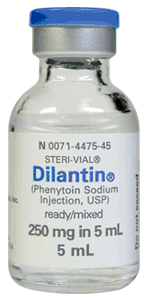Top Class Actions’s website and social media posts use affiliate links. If you make a purchase using such links, we may receive a commission, but it will not result in any additional charges to you. Please review our Affiliate Link Disclosure for more information.

There’s no cure for SJS or TEN. SJS sufferers are treated in burn units, and the “lucky” ones get a correct diagnosis early—but that’s rare. Few doctors have seen SJS or TEN in person, and the rash at first blush looks innocent. It may present similar to poison oak, and in the case of children especially, it is often dismissed as harmless. Although Pfizer’s profitable drug Dilantin has been available since the 1930s, the first warnings about the Dilantin SJS risk didn’t come from the U.S. Food and Drug Administration (FDA) until Nov. 24, 2008.
Dilantin Lawsuits Filed by SJS Victims
Dilantin lawsuits continue to grow in number, but few are as heartbreaking as the case of Jesse Nicholson Jacobson. At 9 years old, she died after taking Dilantin for less than one month. Pfizer settled the Jacobson Dilantin lawsuit for just under $4 million, but of course no amount of compensation can come close to making up for the loss of a child. Like other Dilantin sufferers, Jacobson’s doctors probably thought she had a standard rash, and her pediatrician and parents were unaware of the Dilantin dangers because—according to critics—the warning labels are not sufficient. Doctors, patients and the community in general make decisions based on the safety information provided by drug makers.
A number of medications have been connected to TEN, but Dilantin is one of the most well-known. According to some medical professionals, exams of patients who were being treated for TEN looked as if they were “cooked from the inside out.” It’s a painful ordeal, and some survivors report wishing for death because the pain was so unbearable. Plaintiffs who have filed Dilantin lawsuits say that inadequate warnings caused pain, suffering and death—had these patients known the risks, they could have taken another drug or known the warning signs to watch for.
There’s evidence that Pfizer knew about the risks but failed to act. The company provided warnings of SJS and TEN for medications in the Netherlands and the Czech Republic years ago, but not in the United States. While anyone can become a victim, Asians and African Americans are particularly vulnerable. Some critics say that the larger populations of these communities in the United States compared to the Netherlands and Czech Republic may have something to do with Pfizer’s decision.
Stevens Johnson Syndrome Red Flags
Knowing the symptoms of SJS before it turns into TEN is crucial for the best chances of survival. Anyone taking Dilantin should seek medical attention immediately if a rash occurs, even if it appears harmless. Blisters in wet regions are a tell-tale sign of SJS, and these blisters can quickly spread. Misdiagnoses are common with SJS, so unfortunately many patients are left to their own devices when it comes to understanding the reaction. Since there’s no cure for SJS or TEN, the earlier a victim gets help the better their odds of surviving with fewer permanent injuries. Dilantin has been available for decades, and many people trust it implicitly. However, don’t discount the Dilantin side effects and keep a close watch for any signs of trouble.
In general, Dilantin Stevens Johnson Syndrome lawsuits are filed individually by each plaintiff and are not class actions.
Do YOU have a legal claim? Fill out the form on this page now for a free, immediate, and confidential case evaluation. The attorneys who work with Top Class Actions will contact you if you qualify to let you know if an individual lawsuit or class action lawsuit is best for you. Hurry — statutes of limitations may apply.
ATTORNEY ADVERTISING
Top Class Actions is a Proud Member of the American Bar Association
LEGAL INFORMATION IS NOT LEGAL ADVICE
Top Class Actions Legal Statement
©2008 – 2024 Top Class Actions® LLC
Various Trademarks held by their respective owners
This website is not intended for viewing or usage by European Union citizens.
Get Help – It’s Free
Join a Free Dilantin Stevens Johnson Syndrome Class Action Lawsuit Investigation
If you or a loved one were diagnosed with Stevens Johnson Syndrome (SJS) or toxic epidermal necrolysis (TEN) after taking a prescribed or over-the-counter medication, like Dilantin, you may be eligible to take legal action against the drug’s manufacturer. Filing an SJS lawsuit or class action lawsuit may help you obtain compensation for medical bills, pain and suffering, and other damages. Obtain a free and confidential review of your case by filling out the form below.
An attorney will contact you if you qualify to discuss the details of your potential case at no charge to you.
Oops! We could not locate your form.












